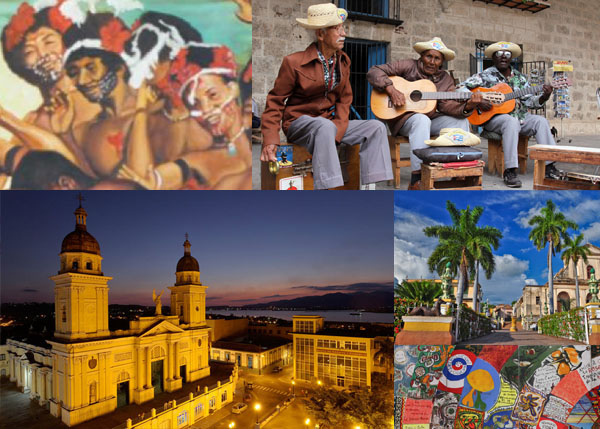11.8 Jazz in Cuba in Cuban Music in the 20th Century (1959-1980).

Jazz, a genre of North American music, expanded and burst onto the scene in Cuba in the late 19th century, but it wasn’t until the late 1920s that the genre began to flourish with the creation of the first jazz bands. Gradually, jazz became more prevalent, and more groups were formed to perform it as they mastered the jazz language and repertoire, although they continued to play Cuban music, especially boleros, danzones, and contemporary songs. Among the most important are Los Curbelo, Havana Casino, Lecuona Cuban Boys, Riverside, Hermanos Palau, and Casino de la Playa.
In the early 1940s, driven by the worldwide success of Cuban music, a fusion of jazz and Afro-Cuban music took place in New York. Over the following decades, these types of orchestras, along with their repertoire, continued to proliferate. Numerous albums were also recorded, famous international jazz stars came to the country, and jazz sections were organized in clubs.
By the 1960s, even though the large jazz bands had declined and almost disappeared, the genre remained alive thanks to small groups that performed in nightclubs and gave recitals and concerts. Among the surviving groups, we can mention that of pianist Felipe Dulzaides, who became a mentor for young jazz musicians. Others included trombonist Pucho Escalante’s Nonet and the Modern Music Quintet, which included Frank Emilio, among others.
During this period, the First Jazz Festival took place in Cuba at the Payret Theater (Prado and San José, Old Havana, Havana City) in 1963. All the groups of the day participated, as well as singers Maggie Prior and Omara Portuondo and Leonardo Timor’s Jazz Band. This was the only active big band in the country after Armando Romeu left the Tropicana cabaret in 1961.
Important jazz musicians emerged from this period, such as: Samuell Téllez, Rubén González, Fernando Vivar, Jorge Varona, and Pedro Chao.
In 1966, the Youth Orchestra of Modern Music was organized by a group of young musicians under the tutelage of Adolfo Pichardo. A year later, the National Council of Culture decided to form a new Jazz Band, directed by the skilled Armando Romeu. During this time, jazz and Latin jazz groups proliferated, such as those of Chucho Valdés and Samuell Téllez.
The first jazz quartets and quintets that participated in international festivals of the genre were formed within the Cuban Modern Music Orchestra, among which the Chucho Valdés Quintet emerged.
Later in 1973, the group Irakere emerged, founded by a virtuoso considered one of the world’s most prominent jazz pianists. Undoubtedly, maestro Chucho Valdés made a valuable contribution to the quality of radio musical sound that has survived to this day. He has won several Grammy awards.
Irakere received significant recognition from numerous jazz musicians and critics who visited Havana on a surprise cruise, including musicians Dizzy Gillespie, Earl Hines, Stan Getz, David Getz, David Amram, and jazz historian Leonard Feather.
For much of the 1970s, Irakere dominated Afro-Cuban jazz with virtually no competition. It was at the end of that period that new groups emerged, such as AfroCuba, initially led by Nicolás Reinoso, and the Quintet of pianist Emiliano Salvador.
Veteran pianist Felipe Dulzaides returns to Havana and turns the Salón Elegante of the Riviera Hotel (Paseo and Malecón Streets, Vedado, Plaza de la Revolución, Havana City) into a meeting place for jazz musicians.
In 1979, singer and multi-instrumentalist Bobby Carcasés prepared a series of concerts at the Casa de la Cultura in the Plaza de la Revolución municipality (Calzada Street No. 909 and 8 Vedado, Plaza de la Revolución, Havana City), which constituted the origin of the event that is today the Jazz Plaza Festival and which had its first edition in 1980.
We must also refer to another group of outstanding Cuban jazz musicians of this era such as: Carlos Emilio Morales Tabares, Francisco de Jesús Rivera Figueras (Paquito D’Rivera), Enrique Plá García, Emiliano Salvador and Oscar Valdés (son).








